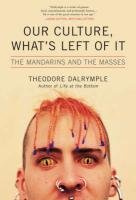Halnorjoe
Our Culture, What's Left of It
The Mandarins and the Masses
av Theodore Dalrymple (forfatter).
Ivan R Dee 2007 Paperback
Halnorjoes eksemplar av Our Culture, What's Left of It - The Mandarins and the Masses
Lesetilstand
Har lest denneHylle
Samfunn og ideologiLesedato
Ingen lesedato
Favoritt
Ingen favoritt
Terningkast
Min omtale
Ingen omtale
Finn boka på biblioteket
Finner du ikke ditt favorittbibliotek på lista? Send oss e-post til admin@bokelskere.no med navn på biblioteket og fylket det ligger i. Kanskje vi kan legge det til!
Bokelskeres terningkastfordeling
0 1 0 0 0 0Diskusjoner om boka
Ingen diskusjoner ennå.
Start en diskusjon om verket Se alle diskusjoner om verketSitater fra dette verket
'Bare rotløs ungdom' :
In the psychotherapeutic worldview
to which all good liberals subscribe, there is no evil,
only victimhood.
The robber and the robbed, the murderer and the murdered,
are alike the victims of circumstance,
united by the events that overtook them.
Future generations (I hope) will find it curious how,
in the century of Stalin and Hitler,
we have been so eager to deny man's capacity for evil.
“Political correctness is communist propaganda writ small.
In my study of communist societies, I came to the conclusionthat the purpose of communist propaganda was not to persuade
or convince,
not to inform, but to humiliate;and therefore, the less it corresponded to reality the better.
When people are forced to remain silent when they are being
told the most obvious lies,
or even worse when they are forced to repeat the lies themselves,
they lose once and for all their sense of probity.
[ integritet, ærlighet ]
To assent to obvious lies is in some 'small' way
to become evil oneself.One's standing to resist anything is thus eroded,
and even destroyed.
A society of emasculated liars is easy to control.
If you examine political correctness,
it has the same effect and is intended to.
”
[― Theodore Dalrymple ]
Shakespeare knows that the tension between men as they are
and men as they ought to be
will forever remain unresolved.
Man's imperfectability is no more an excuse for total permissiveness,
however, than are man's imperfections
a reason for inflexible intolerance.”
No man was more sensitive than Zweig
to the destructive effects upon individual liberty
of the demands of large or strident collectivities.
He would have viewed with horror the cacophony of monomanias—
sexual, racial, social, egalitarian—
that marks the intellectual life of our societies,
each monomaniac demanding legislative restriction on the freedom of others
in the name of a supposed greater, collective good.”
― Theodore Dalrymple
Vi bare kriger litt om herredømmet over
media og åndsklima -- ikke ta det personlig
The loss of the religious understanding of the human condition —
that Man is a fallen creature for whom virtue is necessary but
never fully attainable — is a loss,
not a gain, in true sophistication.
The secular substitute — the belief in the perfection of life
on earth by the endless extension of a choice of pleasures —
is not merely callow by comparison
but much less realistic in its understanding of human nature.”
( Theo. Dalrymple )
"Føleri-samfunnet: Å vurdere ting er slemt udannet?"
The only permissible judgment in polite society
is that no judgment is permissible.
A century-long reaction against Victorian prudery, repression,
and hypocrisy,
led by intellectuals who mistook their personal problems for
those of society as a whole,
has created this confusion.
It is as though these intellectuals were constantly on the run from their stern,
unbending, and joyless forefathers
and as if they took as an unfailing guide to wise conduct
either the opposite of what their forefathers said and did,
or what would have caused them most offence,
had they been able even to conceive of the possibility of such conduct.
Mer sitatstoff her:
Legg inn et nytt sitat Se alle sitater fra verket




